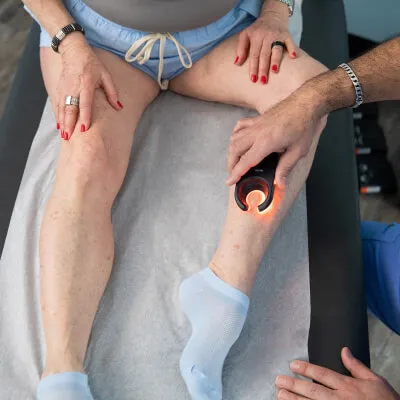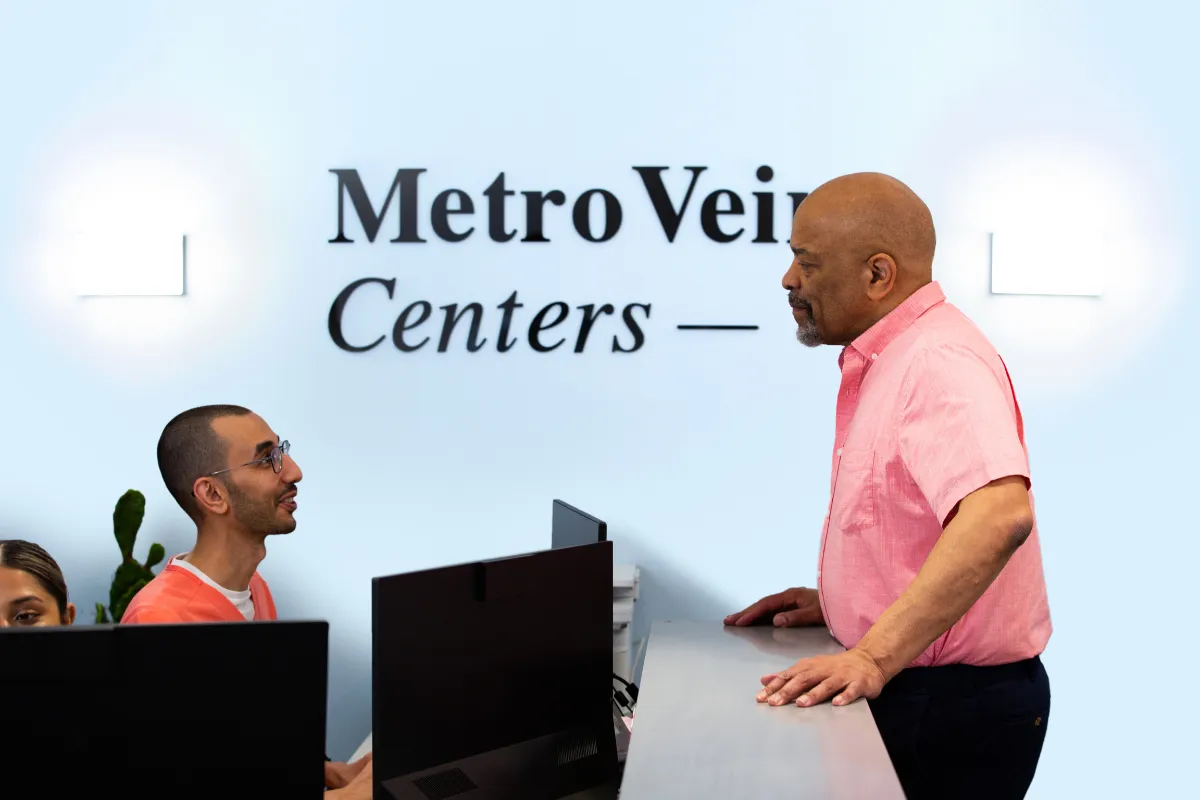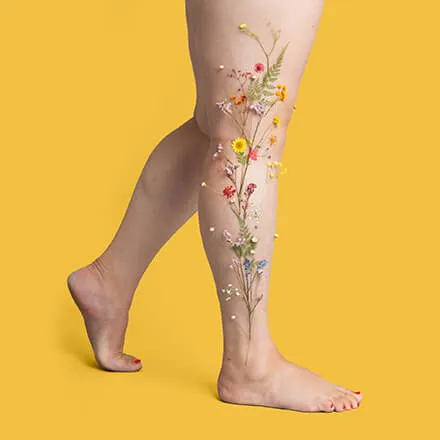For many, the idea of receiving treatment for their visible veins is a new and somewhat challenging research task. With all the information available online, it can be difficult to narrow down your search and avoid misinformation that may cause unwarranted fear. If you've stumbled upon this blog post, you're moving in the right direction! Our team of board-certified vein doctors and specialists offer a wide variety of minimally invasive vein treatments for the removal of varicose veins and spider veins. In this article we'll explore your options, and talk about what you can expect when you come in for your vein evaluation.
The Question On Your Mind...
The number one question our vein specialists hear from new patients is "will vein treatment hurt?"

Our vein therapy options are minimally invasive, which means they're all performed in our vein clinics with no overnight/hospital stays. Treatments can be performed within a 45-minute window, and patients can drive themselves home once they're done! Some people may experience minor discomfort from a needle prick, but it's no different than receiving a shot from a nurse. We administer local anesthetic via a small needle for some of our varicose vein treatment options like Radiofrequency Ablation (RFA) and Endovenous Laser Ablation (EVLA), which allows patients to be pain-free throughout their treatment. There may be sensations of pressure during some treatments, but there should not be any pain. If you find you are uncomfortable during your treatment, your vein doctor may administer further numbing to ensure you're comfortable!
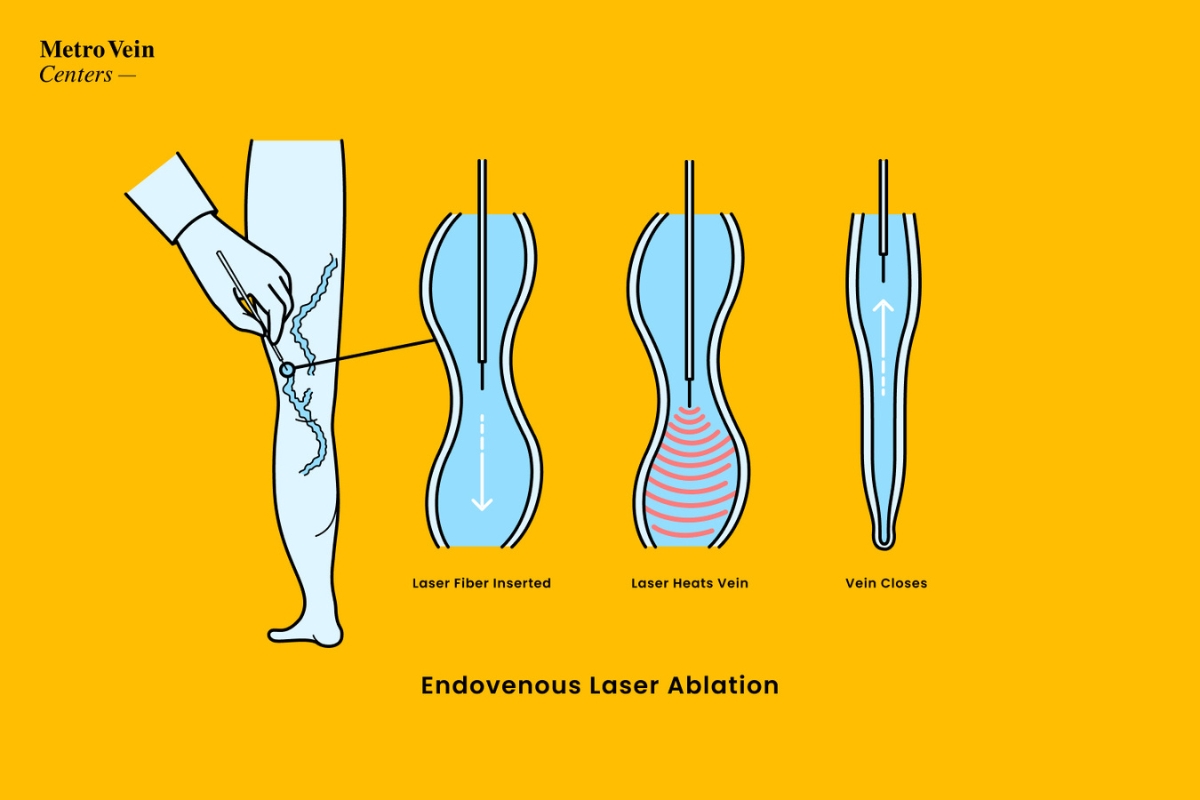
Many of our treatment options, such as excel V+ Laser (a laser spider vein removal treatment) and the previously mentioned RFA and EVLA treatments use heat and laser technology to either use pulsating light to remove visible veins or to close off unhealthy veins with heat energy so they can be reabsorbed into the body. During these treatments, it's not uncommon to experience a very light heat sensation, but never burning. Gentle topical anesthetic and ultrasound-guided treatment prevents any pain or awareness of the heat being used, and allows our vein specialists to perform their treatments in the most efficient way.
The main takeaway to remember as you schedule your appointment with a vein doctor is that treatments are so non-invasive that the only downtime is often merely avoiding strenuous activities for a few days, wearing compression stockings, and elevating your legs. The beauty of these minimally invasive treatments is that the return to day-to-day life is practically seamless, and you can immediately feel the benefits and improvements to your legs. Most of all, it's important to remember that chronic venous insufficiency (and its related symptoms, like varicose veins) is a progressive disease that worsens over time if left untreated. A significant percentage of visits to emergency care revolve around the complications of late-stage CVI, such as open and weeping venous ulcers or traveling blood clots. A large portion of vein treatment is about prevention, and managing your varicose veins before they evolve to deep vein thrombosis, ulcers, and blood clots is going to save you a lot of pain, time, and money in the long run. A quick prick with a needle is preferable to open surgery and hospital stays.

The Aftereffects
Vein therapy, while minimally invasive, can sometimes be accompanied by minor side effects. While these do not occur in every patient, it's important to be aware of every possibility once you leave the clinic. Some patients experience mild bruising following treatments like Radiofrequency Ablation, though this is typically more common in patients who bruise easily in their day-to-day life. Injection sites can become slightly discolored where the local anesthetic was administered, but superficial bruising is not medically concerning, nor does it mean your treatment has failed! This is the body's natural response to a small puncture and injection. If you have received a Tetanus shot, you may recall some tenderness and light bruising. This can also be expected of some vein therapies, and will be detailed by your vein doctor before and after your treatment. Transparency is key, and our vein doctors are adamant about educating their patients on the entirety of the treatment process, including what to expect post-treatment.
Another minor side effect that may occur is slight inflammation following VenaSeal treatment, with minor reactions to the medical-grade adhesive causing mild itching and swelling of the treated leg. This affects less than 1% of patients, and is an uncommon side effect. Consult your vein doctor if you experience any inflammation--while this is not a dangerous side effect, there may be over-the-counter solutions to your discomfort that your vein specialist can recommend to you based on your medical history and tolerances. Again, this affects less than 1% of patients, but a full understanding of all outcomes is paramount in building patient-doctor trust, something our clinic holds at high value.
The old way of doing things was a more invasive surgery known as vein stripping (which we do not perform), which requires up to 4 weeks of rest due to the physically taxing nature of the procedure. Vein stripping also leaves patients with significant bruising and pain following treatment. Our minimally invasive treatment options are gentle enough to require minor or no downtime whatsoever, and rarely require medication following your visit to our clinics. If necessary, our doctors may prescribe anti-inflammatory medicine to counter swelling or redness in the treated veins. Our use of ultrasound-guided therapy and state-of-the-art technology allows our vein specialists to approach each patient with efficiency and accuracy, gently closing unhealthy veins and yielding results that are immediately noticeable in most cases.
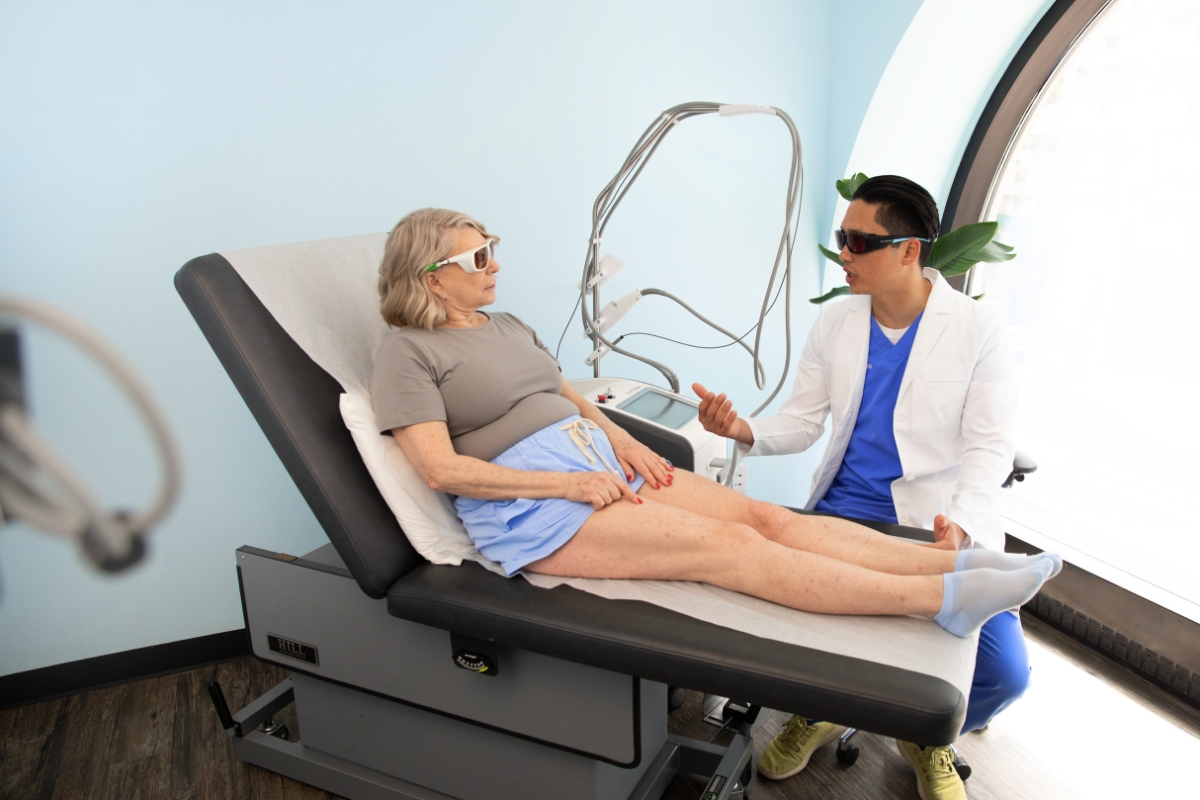
Your vein doctor will speak with you honestly about the recovery time, however minimal, following your treatment. If they anticipate you will bruise, they will be sure to let you know that there is nothing to worry about and advise you on how best to maximize your results. Compression socks drastically improve circulation and can help reduce swelling post-treatment, as does elevating the legs and drinking water. Post-laser, it's best to avoid prolonged sun exposure to reduce the risk of discoloration and sensitivity-induced sun damage. These lifestyle changes are easily managed and will be outlined by our care team both in the clinic and during your follow-up call. Remember, all of our vein treatments are gentle enough that you should not experience pain to the point of discomfort following your visit with our doctors.
If you are experiencing an irregular amount of pain, please do not hesitate to contact our care team. We are more than happy to advise you on how to manage your discomfort, be it through light exercise, rest, the use of compression stockings, or by returning to your nearest vein clinic to speak directly with your vein doctor. We are here to help you find relief, and our top priority is always going to be ensuring you're living comfortably after your treatment.

The Bottom Line
Vein treatment, due to its minimally invasive nature, is not a painful experience. You should not experience pain beyond the light sting of our anesthetic injection during your appointment with a vein specialist, and you will not be left to your own devices when it comes to managing your aftercare. Avoiding vein treatment due to misinformation and fear may run the risk of seeing your symptoms worsen significantly, and it's best to come in for a free evaluation with our vein doctors if you have any concerns or interest in vein therapy. We'll walk with you every step of the way, making sure your journey to healthy, happy legs is as comfortable and stress-free as possible! Vein treatment doesn't need to be an overwhelming, intimidating, or tense experience. We've got you covered.
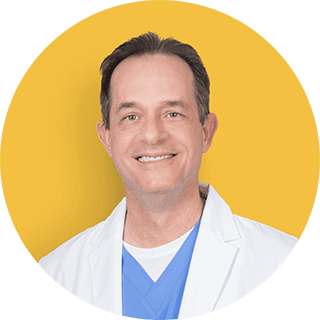
Dr. Philip LoPresti
Meet Dr. Philip LoPresti DO, DABVLM, FACS, a board-certified vein specialist and surgeon with over 20 years of experience. Schedule an appointment with him in Queens, NY today.
Meet Dr. Philip LoPresti
Trusted insight from the nationally accredited, board-certified vein doctors at Metro Vein Centers.


